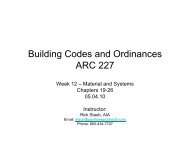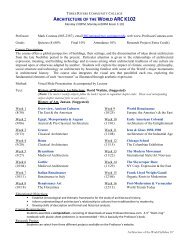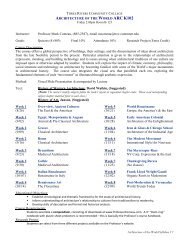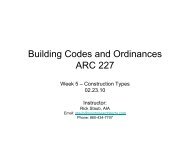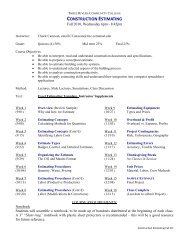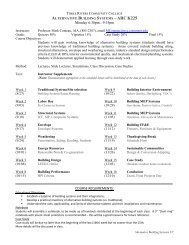Syllabus - Architectural Design Program
Syllabus - Architectural Design Program
Syllabus - Architectural Design Program
Create successful ePaper yourself
Turn your PDF publications into a flip-book with our unique Google optimized e-Paper software.
THREE RIVERS COMMUNITY COLLEGE<br />
CONTRACTS AND SPECIFICATIONS · ARC K221<br />
(Tuesday 6:00 – 8:45pm)<br />
Professor:<br />
Mark Comeau (860-215-9415), email MComeau@trcc.commnet.edu, web www.ProfessorComeau.com<br />
Grading: 4 Exams = 50%, Sample Spec Project = 25%, Final Exam = 25%<br />
Objective:<br />
This course introduces the student to construction industry documents including project<br />
working drawings and the project manual which contains; bidding documents, contract<br />
documents, contract conditions and the specifications. Additional documents include cut<br />
sheets, shop drawings, manufacturer’s specs. and various AIA (American Institute of<br />
Architects) documents used in contract administration. Working knowledge is attained<br />
through actual execution of the documents.<br />
Unit 1 Introduction & Overview Unit 9 The Project Manual<br />
Contractual Documentation<br />
Bidding Documents<br />
Unit 2 <strong>Design</strong> Agreements Unit 10 The Project Manual<br />
Services, Delivery & Payment<br />
Contract Document (A-107)<br />
Unit 3 <strong>Design</strong> Agreements Unit 11 The Project Manual<br />
General Conditions<br />
Contract Conditions<br />
Unit 4 The Working Drawings Unit 12 The Project Manual<br />
Plan View Elements<br />
Specifications<br />
Unit 5 The Working Drawings Unit 13 Project Administration<br />
Elevation View Elements<br />
AIA “G” Series Documents<br />
Unit 6 The Working Drawings Unit 14 Contract Administration<br />
Section Details, Shop Drawings<br />
Quality Control & Management<br />
Unit 7 The Business Environment Unit 15 Project Administration<br />
Firm Org, Fees & Billing Requisition for Payment G702/3<br />
Unit 8 Project Delivery Unit 16 Summary Review<br />
<strong>Design</strong>-Bid-Build, CM, CA<br />
Case-study Discussion<br />
Mid-Term Exam<br />
Final Exam<br />
COURSE REQUIREMENTS:<br />
Notebook<br />
Students will assemble a notebook, to be made up of handouts distributed at the beginning of each class. A<br />
3” “Slant-ring” notebook with plastic sheet protectors is recommended – this will be a good resource for<br />
future reference.<br />
Spec Section<br />
A sample Specification Section will be due no later than the beginning of the last (14th) week but no sooner<br />
than the 11th. More details will be discussed in class.<br />
Contracts & Specs Fall 14’
Educational Objectives:<br />
• Understand the parts and role(s) of Construction Documents including:<br />
▫ Drawings, Contracts, and Specifications;<br />
• Develop a working knowledge of the integration of these documents and their hierarchy;<br />
• Learn to apply research methods and resulting judgment in simulated situational conflict;<br />
• Develop a thorough understanding of various project players and delivery structures;<br />
• Master the parts and roles of the primary Construction Documents:<br />
▫ Construction Drawings<br />
▫ Project Manual Bidding Documents<br />
▫ Project Manual Contract Forms<br />
▫ Project Manual General Conditions<br />
▫ Project manual Specifications (16 Division CSI Format)<br />
Course Requirements:<br />
Students assemble a portfolio, consisting of the various drawings assigned throughout the semester.<br />
Students are expected to work both in class and out of class, to execute the assigned drawings. The<br />
final portfolio is a critical part of the final grade and serves as an important work when transferring<br />
to a baccalaureate program.<br />
Supplies:<br />
Students can anticipate having to purchase drawing vellum and drafting supplies. These will prove<br />
useful in the student’s subsequent career in the construction industries.<br />
ACADEMIC PERFORMANCE<br />
Lecture Period:<br />
Students shall respect the classroom environment. Professors invest valuable time in lecture preparation to make<br />
the course content organized, interesting, and understandable and to make the learning environment collegial.<br />
Unless specifically directed by the professor, students shall refrain from sending email and instant messages, or<br />
from engaging in other activities (reading non-course materials, engaging in private conversations and so on),<br />
that disrespect the classroom environment and learning conditions for others.<br />
Access to the Internet can be a valuable aid to the classroom learning environment. Students are encouraged to<br />
use laptops, smart phones, and other devices in order to explore concepts related to course discussions and<br />
topics. Students are discouraged from using technology in ways that distract from the learning community (e.g.<br />
Facebook, texting, work for other classes, etc.) and if found doing so, will be asked to leave the classroom for the<br />
day and will not get credit for attendance that class period.<br />
Assessment:<br />
Assessment of your mastery of the Courses learning objectives may be administered through quizzes, exams, or<br />
essays. These are announced with ample preparation time and sometimes a study guide. Upon absence from a<br />
class in which an assessment is given, it is the student’s responsibility to request, coordinate and schedule, a<br />
makeup date and time with the professor. Assessments not made up within one week from when initially given<br />
will result a three point reduction from the score earned, per class period lapse.<br />
Online Learning Portfolio<br />
All students are required to maintain an online learning portfolio in Digication that uses the college template, in<br />
as much as it is pertinent and supported by outcome products of this course. Through this electronic tool<br />
students will have the opportunity to monitor their own growth in college-wide learning. The student will keep<br />
his/her learning portfolio and may continue to use the Digication account after graduation. A Three Rivers<br />
General Education Assessment Team will select and review random works to improve the college experience for<br />
all. Student work reviewed for assessment purposes will not include names and all student work will remain<br />
private and anonymous for college improvement purposes. Students will have the ability to integrate learning<br />
from the classroom, college, and life in general, which will provide additional learning opportunities. If desired,<br />
students will have the option to create multiple portfolios.<br />
Contracts & Specs Fall 14’
Integrity:<br />
Any and all exams, papers or reports submitted by you and that bears your name is presumed to be your own<br />
original work that has not previously been submitted for credit in another course unless you obtain prior written<br />
approval to do so from your professor.<br />
In all of your assignments, including homework or drafts of papers, you may use words or ideas written by other<br />
individuals in publications, web sites, or other sources but only with proper attribution. "Proper attribution"<br />
means that you have fully identified the original source and extent of your use of the words or ideas of others<br />
that you reproduce in your work for this course, usually in the form of a footnote or parenthesis.<br />
As a general rule, if you are citing from a published source or from a web site and the quotation is short (up to a<br />
sentence or two), place it in quotation marks; if you employ a longer passage from a publication or web site,<br />
please indent it and use single spacing. In both cases, be sure to cite the original source in a footnote or in<br />
parentheses. (See http://www.plagiarism.org/plag_article_how_do_I_cite_sources.html for more information<br />
on citing.)<br />
If you are uncertain about the expectations for completing an assignment or taking a test or examination, be sure<br />
to seek clarification from your professor beforehand.<br />
Finally, you should keep in mind that as a member of the Three Rivers Community College community, you are<br />
expected to demonstrate integrity in all of your academic endeavors and will be evaluated on your own merits.<br />
Be proud of your academic accomplishments and help to protect and promote academic integrity. The<br />
consequences of cheating and academic dishonesty may include a formal discipline file, possible loss of financial<br />
scholarship or employment opportunities, and denial of admission to a four year college.<br />
Contracts & Specs Fall 14’



